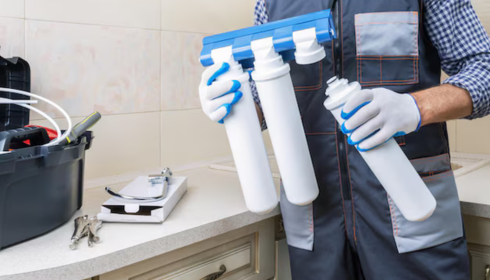There’s something oddly comforting about turning on the tap and knowing that clean, safe water is about to fill your glass. We rarely pause to think about it, yet water is the most basic necessity, quietly shaping our health, our food, and even our morning coffee. Still, as obvious as it sounds, getting that clear, fresh taste isn’t always guaranteed. Between old pipes, hidden contaminants, and everyday wear and tear, water quality can slip faster than most households or businesses realize. That’s where a thoughtful approach to filtration really begins to matter.
Why Clean Water Isn’t Something to Take for Granted
In many parts of the world — yes, even in developed countries — tap water can carry traces of chemicals, sediments, or microorganisms that nobody wants to swallow. Hard water minerals like calcium and magnesium might not be harmful on their own, but they leave behind limescale, clog appliances, and make soap less effective. Then there are more serious contaminants like chlorine, lead, or PFAS compounds, which have made headlines for their potential health risks. The point is, “out of sight, out of mind” doesn’t quite cut it when it comes to the water flowing through your faucet.
What’s interesting is how quickly people notice the difference once a good filtration system is in place. The taste sharpens, the smell improves, and suddenly tea or pasta just feels… cleaner. It’s one of those subtle life upgrades that makes you wonder why you didn’t do it sooner.
The Ongoing Job of Keeping Filters Healthy
Of course, installing a filter isn’t the end of the story. Like any other appliance, filters need care. Think of it like owning a car: you wouldn’t expect it to run smoothly forever without oil changes. Similarly, sediment cartridges get clogged, carbon blocks lose their ability to absorb impurities, and reverse osmosis membranes eventually wear out. Without proper upkeep, the system quietly loses its efficiency — sometimes so gradually you don’t notice until the problems pile up.
That’s why many households rely on a water filter maintenance service, ensuring that cartridges are replaced on schedule, seals are checked, and the system remains as effective as day one. It’s the kind of routine that saves you from unpleasant surprises, whether that’s cloudy water, low pressure, or an unexpected repair bill. Honestly, it’s less about fuss and more about peace of mind.
When the Stakes Are Higher for Businesses
If you think clean water is important at home, imagine the stakes for a café, restaurant, or factory. Coffee shops depend on water clarity to keep espresso machines running at peak performance. Breweries obsess over mineral balance because it affects taste profiles. Even hospitals and laboratories rely on purified water for sanitation and testing accuracy.
That’s why businesses turn to commercial water filtration installation — a more robust approach designed to handle heavy usage and stricter quality standards. Unlike household systems, these setups are built for scale and often come with custom solutions. It’s not just about taste; it’s about compliance, consistency, and protecting expensive equipment. For a business, the cost of downtime or bad water far outweighs the investment in a reliable filtration system.
Choosing the Right Solution for Homeowners
For homeowners, the decision can feel overwhelming at first. Do you go with a simple under-sink filter? A countertop unit? Or a full whole-house system that tackles every tap and showerhead? Each option has its place, depending on water source, local quality, and personal needs.
Many families are now leaning toward water filter installation for home as a long-term safeguard. Whole-house systems, for instance, ensure that every drop — whether for cooking, bathing, or brushing teeth — is treated before it reaches you. For parents, that reassurance is priceless. And unlike bottled water, which piles up plastic waste and recurring costs, a home filter feels like a one-time lifestyle upgrade that keeps paying dividends.
The Human Side of Water Care
It’s easy to get lost in the technical jargon: micron ratings, flow rates, reverse osmosis, UV purification. But at its heart, water filtration isn’t about specs — it’s about people. It’s about kids filling bottles for school, elderly parents who want to avoid extra health risks, or workers who need a reliable cup of coffee to get through the day.
There’s also a certain psychological comfort in knowing your home or business is proactively shielded. Clean water feels like one less thing to worry about in a world that already throws enough surprises our way. In that sense, filters aren’t just mechanical tools. They’re quiet guardians of everyday life.
Practical Tips for Anyone Considering Filtration
If you’re thinking about installing or upgrading a filtration system, a few practical pointers can make the process smoother:
- Test your water first. Knowing what’s in it — hard minerals, chlorine, iron, or bacteria — helps tailor the solution.
- Match the system to your lifestyle. A single apartment dweller may only need a small under-sink filter, while a large family might benefit from a whole-house setup.
- Don’t ignore maintenance. Mark replacement dates on your calendar, or better yet, sign up for a service plan so you don’t have to think about it.
- Consider the long-term savings. Even pricier systems often pay for themselves by reducing bottled water costs and extending appliance life.
- Seek professional advice. Plumbers and filtration experts can prevent common mistakes, like choosing a system that doesn’t handle your water pressure.
Closing Thoughts: Clean Water as an Everyday Luxury
Water is such a simple thing, yet so profoundly important. We shower in it, cook with it, wash our clothes in it — it’s the quiet background of daily life. But when its quality slips, the effects ripple everywhere. Investing in filtration, whether at home or for a business, isn’t just about practicality. It’s about health, confidence, and even a little joy.
So the next time you pour yourself a glass of clear, refreshing water, take a second to appreciate the invisible effort behind it. Because clean water isn’t just a basic need — it’s one of life’s underrated luxuries, and it’s worth taking care of.

